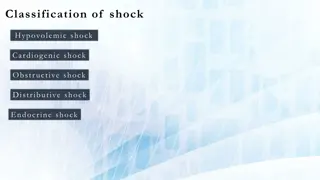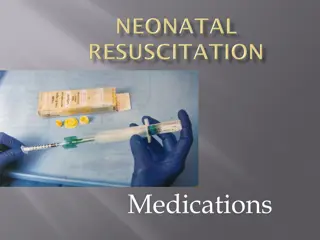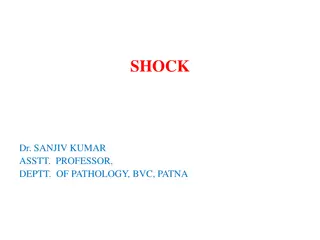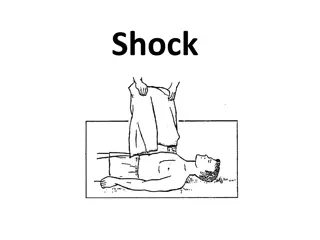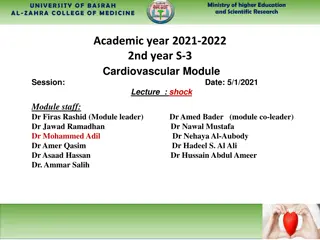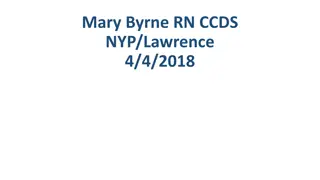Shock Case Studies: Patient Management Scenarios and Interventions
Explore patient scenarios of hypovolemic shock post-surgery, learn key assessments, prioritize actions, recognize shock manifestations, and apply interventions. Dive into the complexities of patient care in critical situations.
0 views • 60 slides
Understanding the Physiology of Shock by Professor Narsingh Verma
Shock is a critical condition resulting from poor tissue perfusion and impaired cellular metabolism. Various definitions describe it as inadequate delivery of oxygen and nutrients, leading to reversible or irreversible cellular injury. Different types of shock, such as hypovolemic shock, have common
0 views • 24 slides
Overview of Shock Classifications and Causes
Shock is classified into different types such as Hypovolemic, Cardiogenic, Obstructive, Distributive, and Endocrine shock. Hypovolemic shock results from fluid loss, while Cardiogenic shock is due to heart failure. Obstructive shock occurs from mechanical obstructions, whereas Distributive shock is
1 views • 11 slides
Neonatal Medication Administration and Resuscitation Overview
Neonatal resuscitation may involve administering medications like epinephrine and volume expanders in specific situations such as hypovolemic shock. Before giving medications, ensure proper ventilation and compressions. Epinephrine helps with coronary artery perfusion and oxygen delivery, while volu
1 views • 15 slides
Understanding Shock: Types, Mechanisms, and Causes by Dr. Sanjiv Kumar
Shock, a critical medical emergency, results from the failure of the circulatory system to adequately perfuse vital organs. This comprehensive overview delves into the different types of shock such as cardiogenic, hypovolemic, septic/endotoxic, neurogenic, and anaphylactic shock. Each type is explor
0 views • 12 slides
Understanding Shock: Types, Classification, and Clinical Course
Shock is a critical state where the circulatory system fails to adequately perfuse cells, leading to oxygen and nutrient delivery reduction. It can be classified into hypovolemic, cardiogenic, and distributive types, with septic shock caused by microbial infections. Shock progresses through stages f
0 views • 8 slides
Understanding Shock: Definitions, Types, and Management Principles
Shock is a condition characterized by inadequate tissue perfusion, leading to a range of systemic effects. This article outlines the definitions, signs and symptoms, general principles of management, and specific types of shock, including hypovolemic, cardiogenic, neurogenic, anaphylactic, and septi
0 views • 20 slides
Understanding Shock: Types, Mechanisms, and Pathophysiology
Shock, a state of systemic hypotension resulting in impaired tissue perfusion and cellular hypoxia, has various types such as cardiogenic, hypovolemic, septic, neurogenic, and anaphylactic shock. Each type has different mechanisms and causes, leading to decreased cardiac output and multiorgan failur
0 views • 45 slides
Understanding Shock in Medical Science: Definitions, Classification, and Management
Shock is a critical condition caused by poor tissue perfusion leading to impaired cellular metabolism. This article discusses the definition of shock, its classification including septic, anaphylactic, cardiogenic, hypovolemic, and neurogenic shock, along with the clinical manifestations and hemodyn
0 views • 19 slides
Understanding Postoperative Shock and Respiratory Failure
Postoperative shock refers to different types of shock that may occur after surgery, such as hypovolemic, cardiogenic, or septic shock. It is crucial to recognize the signs and symptoms of shock early to prevent irreversible consequences. On the other hand, respiratory failure can be acute or chroni
0 views • 8 slides


